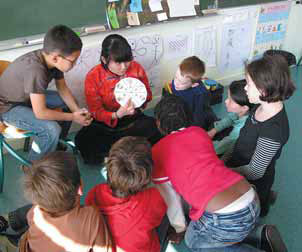Mandarin enjoys greater status in France
Updated: 2013-10-15 07:39
By Li Xiang in Paris (China Daily)
|
||||||||
After an exhausting 10-hour flight and nine-hour train ride, Chang Chunjiao, a college graduate from China, finally arrives in Tarbes, southwestern France. She will work as a volunteer Mandarin teacher there for a year.
Chang, 23, is among a recent batch of volunteers sent by the Chinese Ministry of Education who are ready to go to 40 French cities and towns to teach Mandarin in schools.
Some of her peers will work and live in big cities such as Paris and Lyon, and others will go to places such as Tarbes, with a population of 100,000, near the border with Spain.
Chang is teaching in a high school that has introduced seven foreign languages, and Mandarin is enjoying increasing popularity there.
In fact, Mandarin is enjoying greater status than before across the country. For the semester that started last month, 33,500 college and middle school students and 4,500 primary school students started or resumed Chinese classes, according to newspaper Le Monde. It is a 10-percent increase from last year and five times the number a decade ago, it reported.
The number of students learning Mandarin in France is estimated at between 60,000 and 70,000 if private educational institutions are included. At the same time, about 8,400 French students are studying in China, the Chinese embassy in Paris says.
Chinese has also jumped to the fifth-most popular foreign language taught at French schools, after English, Spanish, German and Italian. Mandarin classes are now offered in all French academic districts, Corsica becoming the latest addition last month.
"French students are very enthusiastic about Chinese," Chang says. "Some are very much into Asian culture and some believe mastering Chinese will add to their competitive edge when they apply for college or a job."
Though Chang says she sometimes feels deep pangs of homesickness, particularly given the scarcity of Chinese living in Tarbes, she has already decided to extend her stay when her one-year term ends.
Experts say the growing popularity of Chinese in French schools has a lot to do with financial pragmatism.
"My students have various profiles but their enthusiasm for China and the Chinese owes much to the economic development of the country and the resulting media coverage," Le Monde quoted Alice Ekman, a China specialist at the French Institute of International Relations, as saying.
Ma Yansheng, an education counselor at the Chinese embassy, says the number of French students learning Chinese will continue to grow as China's influence and economic strength rise.
"Many of them are very optimistic about China's economic growth and see Chinese as a must-have skill and an effective tool for communication, especially in business," Ma says.
"But language is more than a tool. It is also a bridge for cultural exchange and holds far-reaching implications for strengthening relations between our two countries."
China and France will celebrate the 50th anniversary of diplomatic relations next year, which also marks the 200th anniversary of the inauguration of a chair in Chinese at the College of France, said to be the first in the world.
"The establishment of our diplomatic relations in 1964 has significantly pushed exchanges between our two countries, and education is one of the fields that has benefited greatly from it," says Joel Bellassen, general inspector of Chinese at the French Ministry of Education.
More than half of those in France who are learning Mandarin started in junior high school, indicating that Mandarin has gained greater status in the French basic education system, Bellasen says.
But, Chinese teaching has started to experience some growing pains in recent years as the gap has widened between supply and demand in resources, he says.
There are now about 450 registered Mandarin teachers in France, the education office of the Chinese embassy says. However, only 40 percent of them are officially employed. Nine years ago there were only 135 registered teachers of the language, the office says.
To tackle the shortage of Chinese teachers abroad, the Chinese Ministry of Education has started to dispatch volunteer teachers worldwide. France began to receive volunteers in 2005 and has become one of the countries to receive the highest number.
In July, nearly 200 Mandarin teachers were sent to France to teach more than 5,900 students in schools.
Volunteers like Chang have to pass tests and undergo special training, and those who have experience teaching the language in China are given preference.
In 2008, the Chinese and French ministries of education launched a program of international Mandarin classes in French schools that aims to cultivate and train elites in Mandarin and Chinese culture.
Confucius Institutes also play a major role in promoting China, its language and culture in France. There are 15 Confucius Institutes in the country, and they offer a total of 476 Mandarin classes, the education office at the Chinese embassy says.
The French ministries of education and foreign affairs have also proposed launching the first training program of Mandarin teachers in France on the occasion of the 50th anniversary of Sino-French diplomatic relations next year, Bellassen says.
"While the number of students and Chinese classes continues to grow, ensuring teaching quality is the next key thing," he says. "And we need to have more training programs and hire more trainers for our Mandarin teachers."
lixiang@chinadaily.com.cn
|
A volunteer teacher gives French students a Mandarin lesson. Provided to China Daily |
(China Daily 10/15/2013 page18)

 Victoria Beckham S/S 2014 presented during NYFW
Victoria Beckham S/S 2014 presented during NYFW
 'Despicable' minions upset Depp's 'Lone Ranger' at box office
'Despicable' minions upset Depp's 'Lone Ranger' at box office
 'Taken 2' grabs movie box office crown
'Taken 2' grabs movie box office crown
 Rihanna's 'Diamonds' tops UK pop chart
Rihanna's 'Diamonds' tops UK pop chart
 Fans get look at vintage Rolling Stones
Fans get look at vintage Rolling Stones
 Celebrities attend Power of Women event
Celebrities attend Power of Women event
 Ang Lee breaks 'every rule' to make unlikely new Life of Pi film
Ang Lee breaks 'every rule' to make unlikely new Life of Pi film
 Rihanna almost thrown out of nightclub
Rihanna almost thrown out of nightclub
Most Viewed
Editor's Picks

|

|

|

|

|

|
Today's Top News
Cosmetics is a mirror to China's economy
Row over NASA's ban should be wake-up call
Chinese may have discovered the future of batteries
UK 'open' to Chinese nuclear investment
All 86 tourists evacuated from Mount Qomolangma
Obama hopeful as meeting nears
Canton Fair to promote yuan use
Over 380 detained in Moscow riot
US Weekly

|

|








